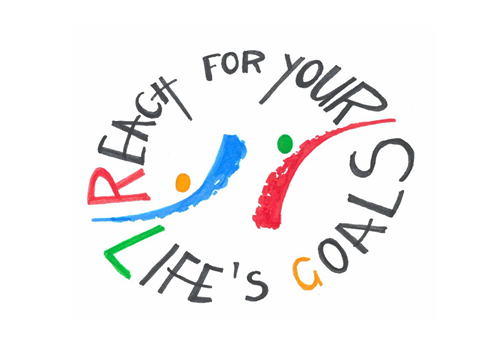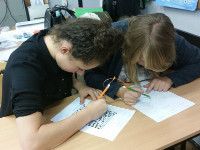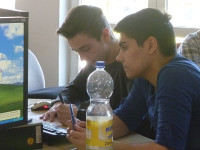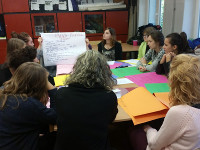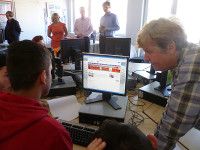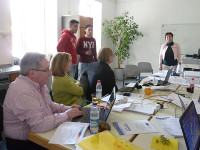Second sequence of German test groups
February – July 2016
The RLG programme connects closely with the basic activities of ETC for the German partners, which offers the likelihood that local practice will preserve the results of the project in an organic way.
The components were jointly developed and built in as a module into the training of those young people facing career choices. Each year the labour centre commissions the ETC to support these young people into work. More recently, supporting young migrants arriving in Germany without adult relatives has become a new state-financed task of schools since the beginning of 2016. The experts of the ETC have simultaneously tested the exercises of the programme in other institutions.
Secondary schools providing general education tested several exercises of the RLG programme with students aged 12-13 on their career orientation days of December 2015 and April 2016. The exercises were tried out by 18-20 persons. The social composition of the students represented the urban average – with a relatively high ratio of migrant and disadvantaged students. Experience however shows that the exercises functioned fairly well in this environment. Students have enjoyed the activities though they have found the exercises to require a high level of concentration.
A special school tested several exercises in March 2016 with participants aged 12. The German colleagues tested various levels of difficulty while adjusting to the special features of the children. They verified that some of the exercises could be well adjusted to the capabilities of students with special needs and the participants enjoyed them.
ETC started working with young refugee people in February of 2016. The first group – most of them boys aged 16-21 – was a group of 12 who were from African and Asian countries. They had acquired some trade skills in their home countries, it was however difficult to assess the level and content of their expertise due the low level of their German language competence. They had traumatized mental states and were without family ties or official guardians. The RLG exercises can be included in the ten month Bridge Year programme which aims at integrating them into German culture and society though learning. The aim is to prepare these young people to be able to find a trade within the labour market. ETC staff want to make the migrants familiar with everyday customs (social conventions and roles, forms of behaviour, etc.), fields of labour (ways of getting employed, expectations, etc.) – while they can acquire practical experience in various trades. Considering their composition and needs this makes these groups very similar to NEET young people which the programme aims at.
It is a serious challenge for them to gain development in various competence fields with their low level language skills in German. The exercises of RLG programme which focus on practical skills in work are emphasised in their training.. They need to acquire problems solving skills most of all. Those activities which focused on self-presentation were particularly important for the participants because they help them develop deep knowledge and self-confidence.
RLG activities have been occasionally used within prisons since December of 2015. The participants are exclusively males between 25 and 70. They make a fairly mixed group as far as their education is concerned. Most of them are trained people, you can however find some who are illiterate and people with higher education in this group as well. 6-14 persons participate occasionally in the activities. They are characterized by some sort of mental isolation due to being imprisoned for a long time. After being encouraged to cooperate they have however enjoyed the exercises.
The most important general experiences of testing that might be built into the development process were as follows:
- Some groups will complete their exercises faster than the others. That is why the decision was made to produce shorter time filling exercises trainers can easily pull out of their sleeves.
- Activities should have a stress free atmosphere – except for situations when activities themselves produce stressful settings (for example: solving problems or making decisions).
- Trainers should consider the ethnic and cultural composition of the groups – think of the activities requiring physical contact. Such activities might be deferred even in the case of working with homogenous groups.
- Each activity should be initiated by analysing which skills and competences they will develop.
- Positive and frequent feedback is extremely essential because it helps and encourages young people to find the right course of development. That is why we should motivate the participants to evaluate and understand even the slightest move towards the right direction.
Elaborating the topics of the RLG activities in a workshop proved to be fairly productive for groups cooperating permanently and preparing for a career choice. The English and German language board game Business Master has been a great success and it is considered as the country specific component of the programme. The game has been financed by Bavarian firms and aimed at developing entrepreneurial knowledge and skills.
The programme for those newly arrived young people who were delegated by the labour centre has continued since the autumn of 2016. An assessment day of ETC competences was organized for 31 participants in three new groups in September.
10. 2016


